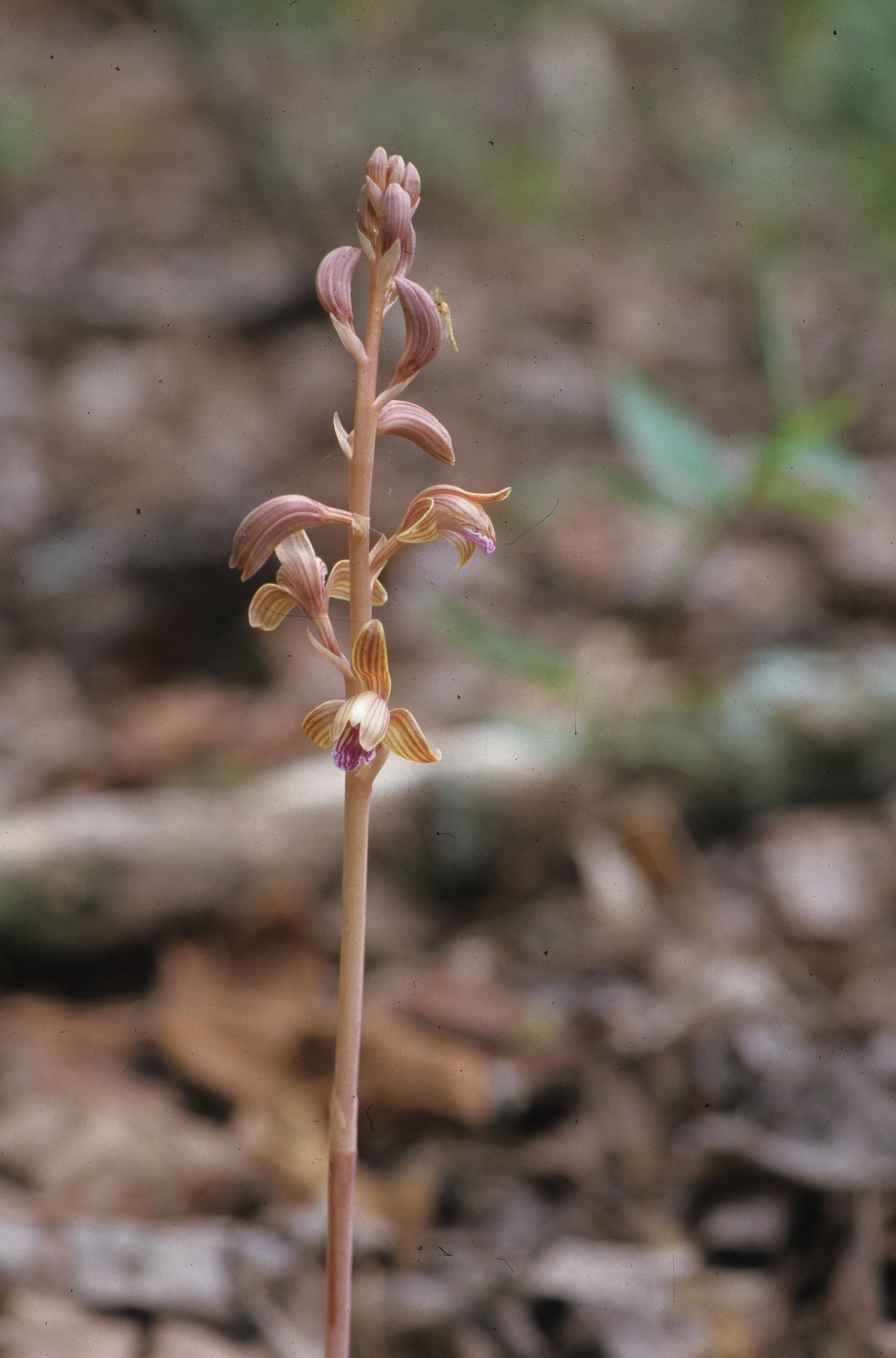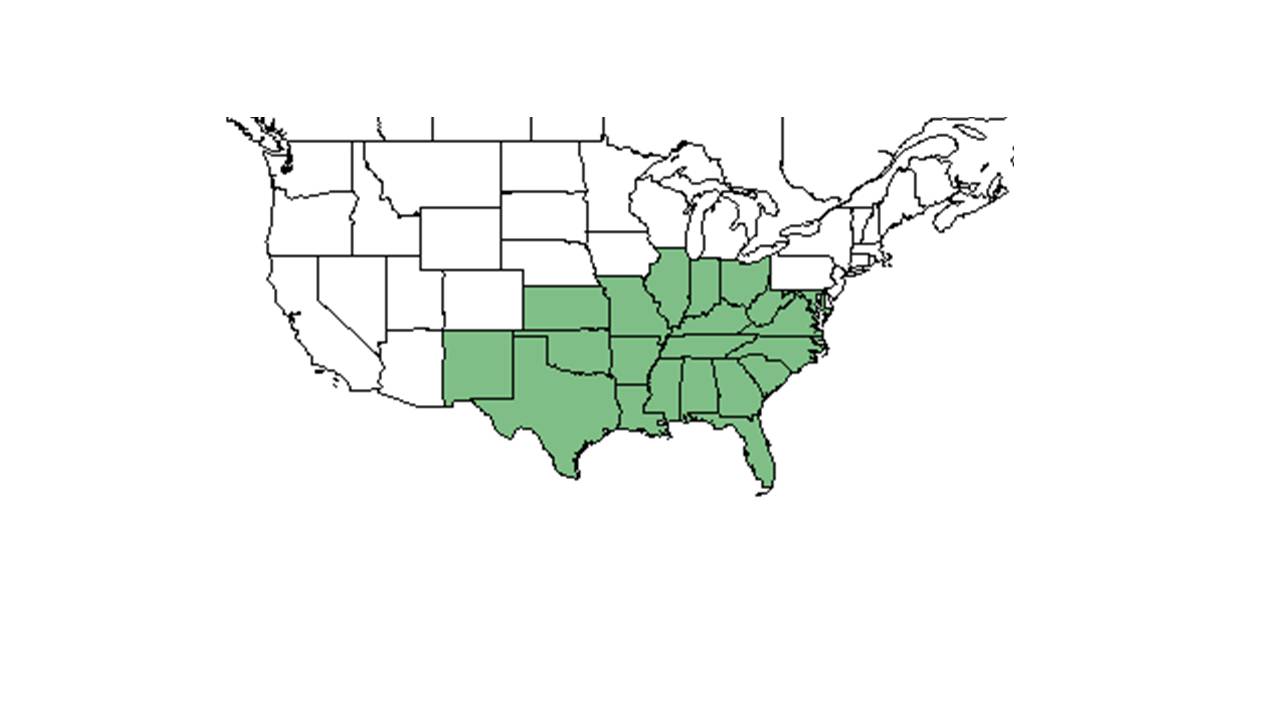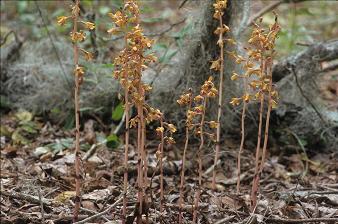Difference between revisions of "Hexalectris spicata"
(→Photo Gallery) |
(→Distribution) |
||
| (45 intermediate revisions by 11 users not shown) | |||
| Line 15: | Line 15: | ||
| binomial_authority = (Walter) Barnhart | | binomial_authority = (Walter) Barnhart | ||
| range_map = HEXA_SPIC_dist.jpg | | range_map = HEXA_SPIC_dist.jpg | ||
| − | | range_map_caption = Natural range of ''Hexalectris spicata'' from USDA NRCS [http:// | + | | range_map_caption = Natural range of ''Hexalectris spicata'' from USDA NRCS [http://plants.usda.gov/core/profile?symbol=HESP3 Plants Database]. |
}} | }} | ||
| + | |||
| + | Common name: crested coralroot (Nelson 2005), brunetta | ||
| + | ==Taxonomic notes== | ||
| + | Synonyms: none<ref name=weakley>Weakley, A.S. 2020. Flora of the Southeastern United States. Edition of 20 October 2020. University of North Carolina at Chapel Hill, Chapel Hill, North Carolina.</ref> | ||
| + | |||
| + | Varieties: none<ref name=weakley/> | ||
| + | |||
==Description== | ==Description== | ||
<!-- Basic life history facts such as annual/perrenial, monoecious/dioecious, root morphology, seed type, etc. --> | <!-- Basic life history facts such as annual/perrenial, monoecious/dioecious, root morphology, seed type, etc. --> | ||
| + | A description of ''Hexalectris spicata'' is provided in [http://www.efloras.org/florataxon.aspx?flora_id=1&taxon_id=242101666 The Flora of North America]. | ||
| + | |||
| + | ''Hexalectris spicata'' is a perennial herbaceous species with rhizomes.<ref name=fsu>Florida State University Robert K. Godfrey Herbarium database. URL: http://herbarium.bio.fsu.edu. Last accessed: June 2014. Collectors: Harry E. Ahles, Loran C. Anderson, Bill & Pam Anderson, A. F. Clewell, A. Gholson Jr., Robert K. Godfrey, John G. Haesloop, Dale R. Jackson, Rob Jemson, R. Kral, Mark Ludlow, Richard S. Mitchell, Jamie Trescott, Rodie White, and Lovett E. Williams. States and Counties: Alabama: Houston and Wilcox. Florida: Calhoun, Dixie, Gadsden, Jackson, Leon, Liberty, Okaloosa, Suwannee, and Wakulla. Georgia: Decatur, Grady, and Seminole. South Carolina: Bamberg.</ref> | ||
| + | |||
==Distribution== | ==Distribution== | ||
| + | This plant's range extends from Maryland, Ohio, and Missouri to Florida and southwestern Texas.<ref name=weakley/> | ||
| + | |||
==Ecology== | ==Ecology== | ||
| + | ''H. spicata'' is a saprophytic orchid.<ref name=nelson/> | ||
===Habitat=== <!--Natural communities, human disturbed habitats, topography, hydrology, soils, light, fire regime requirements for removal of competition, etc.--> | ===Habitat=== <!--Natural communities, human disturbed habitats, topography, hydrology, soils, light, fire regime requirements for removal of competition, etc.--> | ||
| + | It is found in rich woods, stream banks, hardwood slope forests, mixed pine and hardwood forests, and shortleaf pine-oak-hickory forests.<ref name=nelson>Nelson, Gil. East Gulf Coastal Plain Wildflowers. A Field Guide to the Wildflowers of the East Gulf Coastal Plain, including Southwest Georgia, Northwest Florida, Southern Alabama, Southern Mississippi, and Parts of Southeastern Louisiana. Guilford, CT: Falcon, 2005. 234. Print.</ref> | ||
| + | |||
===Phenology=== <!--Timing off flowering, fruiting, seed dispersal, and environmental triggers. Cite PanFlora website if appropriate: http://www.gilnelson.com/PanFlora/ --> | ===Phenology=== <!--Timing off flowering, fruiting, seed dispersal, and environmental triggers. Cite PanFlora website if appropriate: http://www.gilnelson.com/PanFlora/ --> | ||
| − | ===Seed dispersal=== | + | Blooming from June through August.<ref name=nelson/><ref>Nelson, G. [http://www.gilnelson.com/ PanFlora]: Plant data for the eastern United States with emphasis on the Southeastern Coastal Plains, Florida, and the Florida Panhandle. www.gilnelson.com/PanFlora/ Accessed: 19 MAY 2021</ref> It has also been observed fruiting in June and August.<ref name=fsu/> |
| − | ===Seed bank and germination=== | + | <!--===Seed dispersal===--> |
| − | ===Fire ecology=== <!--Fire tolerance, fire dependence, adaptive fire responses--> | + | <!--===Seed bank and germination===--> |
| − | ===Pollination=== | + | <!--===Fire ecology===--> <!--Fire tolerance, fire dependence, adaptive fire responses--> |
| − | === | + | <!--===Pollination===--> |
| − | ===Diseases and parasites=== | + | <!--===Herbivory and toxicology===--> |
| − | ==Conservation and | + | <!--===Diseases and parasites===--> |
| − | == | + | |
| + | ==Conservation, cultivation, and restoration== | ||
| + | |||
| + | ==Cultural use== | ||
| + | |||
| + | ==Photo Gallery== | ||
| + | <gallery widths=180px> | ||
| + | |||
| + | File:Hexalectris spicata2_Gil.jpg| <center> ''Hexalectris spicata'' <p> Photo by Gil Nelson </p> | ||
| + | |||
| + | </nowiki></gallery> | ||
| + | |||
==References and notes== | ==References and notes== | ||
| − | |||
| − | |||
| − | |||
| − | |||
| − | |||
Latest revision as of 16:59, 30 May 2023
| Hexalectris spicata | |
|---|---|

| |
| Photo was taken by Gil Nelson | |
| Scientific classification | |
| Kingdom: | Plantae |
| Division: | Magnoliophyta - Flowering plants |
| Class: | Liliopsida – Monocotyledons |
| Order: | Orchidales |
| Family: | Orchidaceae |
| Genus: | Hexalectris |
| Species: | H. spicata |
| Binomial name | |
| Hexalectris spicata (Walter) Barnhart | |

| |
| Natural range of Hexalectris spicata from USDA NRCS Plants Database. | |
Common name: crested coralroot (Nelson 2005), brunetta
Contents
Taxonomic notes
Synonyms: none[1]
Varieties: none[1]
Description
A description of Hexalectris spicata is provided in The Flora of North America.
Hexalectris spicata is a perennial herbaceous species with rhizomes.[2]
Distribution
This plant's range extends from Maryland, Ohio, and Missouri to Florida and southwestern Texas.[1]
Ecology
H. spicata is a saprophytic orchid.[3]
Habitat
It is found in rich woods, stream banks, hardwood slope forests, mixed pine and hardwood forests, and shortleaf pine-oak-hickory forests.[3]
Phenology
Blooming from June through August.[3][4] It has also been observed fruiting in June and August.[2]
Conservation, cultivation, and restoration
Cultural use
Photo Gallery
References and notes
- ↑ 1.0 1.1 1.2 Weakley, A.S. 2020. Flora of the Southeastern United States. Edition of 20 October 2020. University of North Carolina at Chapel Hill, Chapel Hill, North Carolina.
- ↑ 2.0 2.1 Florida State University Robert K. Godfrey Herbarium database. URL: http://herbarium.bio.fsu.edu. Last accessed: June 2014. Collectors: Harry E. Ahles, Loran C. Anderson, Bill & Pam Anderson, A. F. Clewell, A. Gholson Jr., Robert K. Godfrey, John G. Haesloop, Dale R. Jackson, Rob Jemson, R. Kral, Mark Ludlow, Richard S. Mitchell, Jamie Trescott, Rodie White, and Lovett E. Williams. States and Counties: Alabama: Houston and Wilcox. Florida: Calhoun, Dixie, Gadsden, Jackson, Leon, Liberty, Okaloosa, Suwannee, and Wakulla. Georgia: Decatur, Grady, and Seminole. South Carolina: Bamberg.
- ↑ 3.0 3.1 3.2 Nelson, Gil. East Gulf Coastal Plain Wildflowers. A Field Guide to the Wildflowers of the East Gulf Coastal Plain, including Southwest Georgia, Northwest Florida, Southern Alabama, Southern Mississippi, and Parts of Southeastern Louisiana. Guilford, CT: Falcon, 2005. 234. Print.
- ↑ Nelson, G. PanFlora: Plant data for the eastern United States with emphasis on the Southeastern Coastal Plains, Florida, and the Florida Panhandle. www.gilnelson.com/PanFlora/ Accessed: 19 MAY 2021
